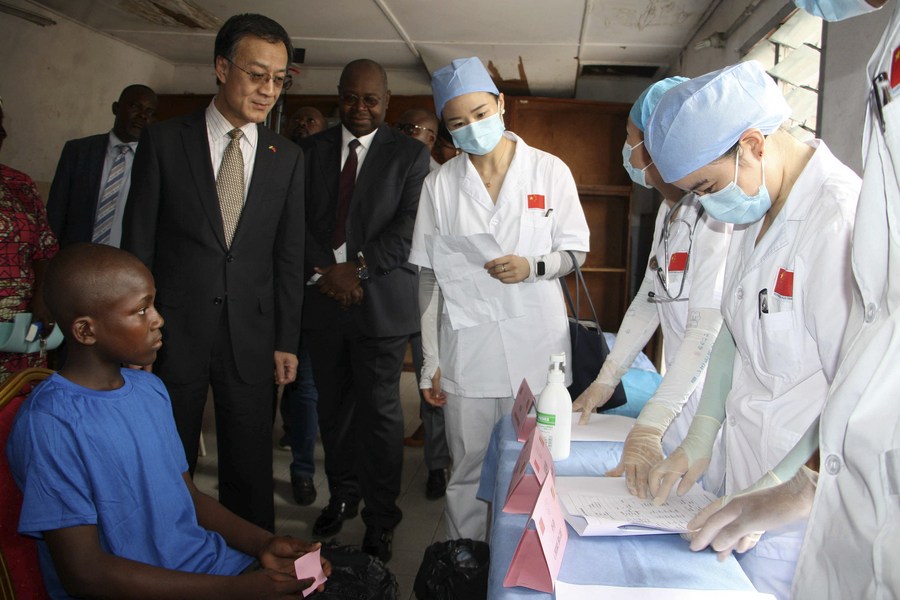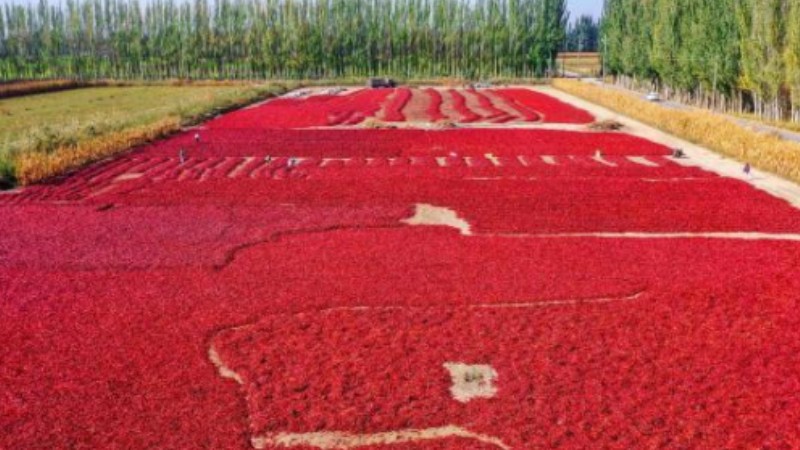Medical teams lauded for contributions

Doctors from the 29th Chinese medical team to the Republic of the Congo provide physical exam for children at an adoption center in Brazzaville, capital of the Republic of the Congo, May 30, 2023. [Photo by Guy-Gervais Kitina/Xinhua]
China dispatched more than 30,000 health workers abroad in past 60 yrs
China's foreign medical aid teams were awarded the title of "role model of the times" by the Publicity Department of the Communist Party of China Central Committee on Friday as this year marks the 60th anniversary of the country's first medical team dispatched to Algeria.
Since 1963, China has dispatched more than 30,000 medical workers to 76 countries and regions, and helped build more than 130 healthcare facilities overseas. They have treated nearly 300 million patients and saved countless lives in their localities, according to official figures.
In the past decade, Chinese medical groups have introduced more advanced diagnosis and treatment technologies to other developing economies and regions, and established paired assistance programs with local hospitals.
A series of themed medical programs, such as a mission focusing on carrying out cataract surgeries and another one helping children with cleft lip and palate have also been rolled out.
In the meantime, Chinese medical professionals have trained a large number of local medical staff members to improve their own medical services and capacities.
About 50 Chinese medical workers died during their aid missions overseas.
Their selfless love, exquisite medical skills and continuous dedications over generations have achieved wide acclaim from the international community, according to the Publicity Department of the CPC Central Committee.
Tong Ling, a 69-year-old ophthalmologist from Tianjin Municipal People's Hospital, worked for eight years in the Congo and Gabon.
Her first mission starting in 1995 in the Congo was cut short abruptly when local armed conflicts worsened and she and her teammates had to hide with a local family for over a week, threatened by a shortage of food and water, and by relentless mosquitoes and insects.
"After returning to my home country, I could not help dwelling on the hospital that I worked at in the Congo and my fellow colleagues and patients there," Tong said. "So I signed up again in 2002, returned to the same hospital and completed the mission successfully."
During her fourth foreign aid mission in Libreville, capital of Gabon, Tong shouldered the fresh tasks of renovating and preparing local facilities to receive larger groups of Chinese medical workers in the future, as well as participating in negotiations for bilateral agreements on medical aid between local and Chinese governments.
Tong contracted malaria several times during her mission overseas and had to perform injections by herself for treatment.
"But through our hard work, knowledge and dedication, we have won respect and praise from our friends in Africa and built friendship with them," she said.
Li Junsheng, head of the surgical department at the Fourth Hospital of Inner Mongolia autonomous region, took part in six batches of medical aid drives in Rwanda.
"Rwanda is in dire need of medical professionals, and many patients with common illnesses cannot access timely treatment," he said.
To make up for a lack of minimally evasive tools and nursery care staff for the intensive care units, Li said that Chinese doctors strived to make incisions as small as possible and visit hospital wards more often.
"To increase nutrition of impoverished patients who just underwent surgery, Chinese doctors even share their meals with them," he said.
"A number of patients had already dug deep into their pockets to cover transportation fees to and from the hospital and they waited in long lines to see me," he said. "I could understand their hardship and always try my best to save them trouble."
Photos
Related Stories
- China to establish national-level expert medical emergency response teams
- A song of great love: China's international medical assistance contributes to human peace, development
- 19th Chinese medical team provides medical services in Senegal
- Six decades of selfless aid make Chinese doctors "most welcome guests" in Africa
- Feature: Chinese doctors win hearts, applause with professionalism, dedication in remote areas of Morocco
Copyright © 2023 People's Daily Online. All Rights Reserved.









